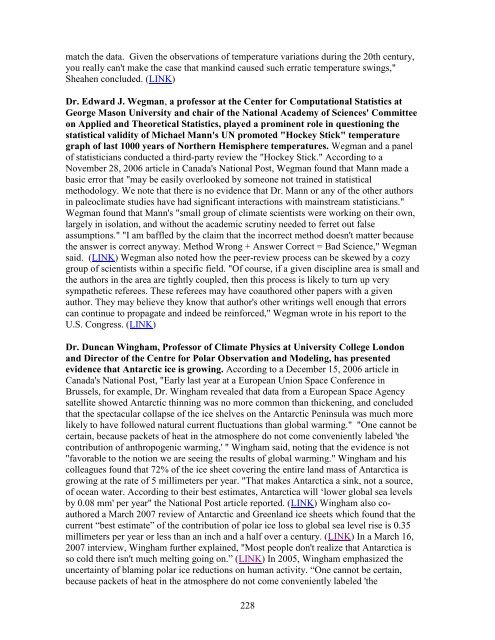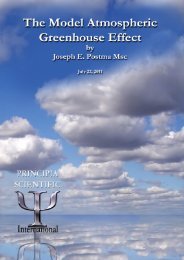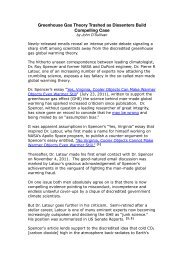Than 1000 International Scientists Dissent Over Man-Made Global ...
Than 1000 International Scientists Dissent Over Man-Made Global ...
Than 1000 International Scientists Dissent Over Man-Made Global ...
You also want an ePaper? Increase the reach of your titles
YUMPU automatically turns print PDFs into web optimized ePapers that Google loves.
match the data. Given the observations of temperature variations during the 20th century,<br />
you really can't make the case that mankind caused such erratic temperature swings,"<br />
Sheahen concluded. (LINK)<br />
Dr. Edward J. Wegman, a professor at the Center for Computational Statistics at<br />
George Mason University and chair of the National Academy of Sciences' Committee<br />
on Applied and Theoretical Statistics, played a prominent role in questioning the<br />
statistical validity of Michael <strong>Man</strong>n's UN promoted "Hockey Stick" temperature<br />
graph of last <strong>1000</strong> years of Northern Hemisphere temperatures. Wegman and a panel<br />
of statisticians conducted a third-party review the "Hockey Stick." According to a<br />
November 28, 2006 article in Canada's National Post, Wegman found that <strong>Man</strong>n made a<br />
basic error that "may be easily overlooked by someone not trained in statistical<br />
methodology. We note that there is no evidence that Dr. <strong>Man</strong>n or any of the other authors<br />
in paleoclimate studies have had significant interactions with mainstream statisticians."<br />
Wegman found that <strong>Man</strong>n's "small group of climate scientists were working on their own,<br />
largely in isolation, and without the academic scrutiny needed to ferret out false<br />
assumptions." "I am baffled by the claim that the incorrect method doesn't matter because<br />
the answer is correct anyway. Method Wrong + Answer Correct = Bad Science," Wegman<br />
said. (LINK) Wegman also noted how the peer-review process can be skewed by a cozy<br />
group of scientists within a specific field. "Of course, if a given discipline area is small and<br />
the authors in the area are tightly coupled, then this process is likely to turn up very<br />
sympathetic referees. These referees may have coauthored other papers with a given<br />
author. They may believe they know that author's other writings well enough that errors<br />
can continue to propagate and indeed be reinforced," Wegman wrote in his report to the<br />
U.S. Congress. (LINK)<br />
Dr. Duncan Wingham, Professor of Climate Physics at University College London<br />
and Director of the Centre for Polar Observation and Modeling, has presented<br />
evidence that Antarctic ice is growing. According to a December 15, 2006 article in<br />
Canada's National Post, "Early last year at a European Union Space Conference in<br />
Brussels, for example, Dr. Wingham revealed that data from a European Space Agency<br />
satellite showed Antarctic thinning was no more common than thickening, and concluded<br />
that the spectacular collapse of the ice shelves on the Antarctic Peninsula was much more<br />
likely to have followed natural current fluctuations than global warming." "One cannot be<br />
certain, because packets of heat in the atmosphere do not come conveniently labeled 'the<br />
contribution of anthropogenic warming,' " Wingham said, noting that the evidence is not<br />
"favorable to the notion we are seeing the results of global warming." Wingham and his<br />
colleagues found that 72% of the ice sheet covering the entire land mass of Antarctica is<br />
growing at the rate of 5 millimeters per year. "That makes Antarctica a sink, not a source,<br />
of ocean water. According to their best estimates, Antarctica will ‗lower global sea levels<br />
by 0.08 mm' per year" the National Post article reported. (LINK) Wingham also coauthored<br />
a March 2007 review of Antarctic and Greenland ice sheets which found that the<br />
current ―best estimate‖ of the contribution of polar ice loss to global sea level rise is 0.35<br />
millimeters per year or less than an inch and a half over a century. (LINK) In a March 16,<br />
2007 interview, Wingham further explained, "Most people don't realize that Antarctica is<br />
so cold there isn't much melting going on.‖ (LINK) In 2005, Wingham emphasized the<br />
uncertainty of blaming polar ice reductions on human activity. ―One cannot be certain,<br />
because packets of heat in the atmosphere do not come conveniently labeled 'the<br />
228





